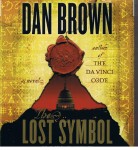The Lost Symbol by Dan Brown (audio version) (2009; Random House. ISBN 978-0-7393-0956-8)
I read Dan Brown for the first time when I was sitting at the Green Man Festival at Spirit Mountain in Duluth one summer, not so far past. Here’s a tip for you would-be paperback writers: Don’t try to sell novels at a folk music festival. Though the crowd is generally interested in reading, they’re not interested in buying books to lug around a music venue. Just a heads up. Anyway, with few customers, I read the entirety of The Da Vinci Code over the three days of the event. It was indeed, to steal an overused phrase, a “page turner”. Though I’m not much of genre fiction guy, the book held my interest with its premise and pace.
I haven’t read Angels and Demons, another book in which Brown details further exploits of his protagonist, Robert Langdon, but I did see the movie: very disappointing in comparison with both the book and movie versions of Da Vinci. But when someone bought me the audio version of Brown’s latest, The Lost Symbol, and I knew I had a good five hour drive ahead of me this past weekend to sell books in Rochester, Minnesota (see posts for results of that fiasco!), I thought, This is as good a time as any to listen to the new Dan Brown book in the car.
Well, turns out, it wasn’t such a hot idea after all. Now, I get genre fiction. I generally enjoy Grisham’s take on legal issues of the day wrought in fiction. Some of his and Scott Turow’s work approaches literature in language, nuance, and character. And I can enjoy a Kent Kruger Minnesota-based mystery, or a John Hassler book on occasion. But when confronted with an author lecturing me (telling and not showing) for the entire final hour of a novel on CD, well, that’s just too damn much to take!
Ostensibly the story of a crazed lunatic who seeks a key to unlock ancient mysteries held by the Masons (that’s right, the guys who gave us the Shrine Circus apparently hold a secret within their ritual so dark and devastating as to cause an orge to go on a murdering rampage to secure it), the book starts with a bang. Action abounds from the first page on, until, inexplicably, somewhere about hour five of the six hour audio experience, the chase is over, the bad guy (spoiler alert) is dead, the girl is saved, and Robert Langdon is the subject of a lengthy lecture by a very smart but very ponderous author.
Save your money and buy Turow’s latest which I haven’t even read but which I know will be far better than this misconceived bundle of gibberish. The only saving grace is that you learn a lot about Washington D.C.’s architecture. But you could get that from a tour guide. 2 stars out of 5.



